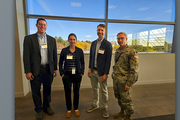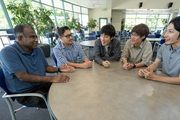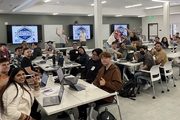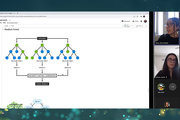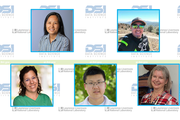Did you know we have a monthly newsletter? View past volumes and subscribe.
Welcome new DSI team members
April 2, 2024 -
When Data Science Institute (DSI) director Brian Giera and deputy director Cindy Gonzales began planning activities for fiscal year 2024 and beyond, they immediately realized that LLNL’s growth in data science and artificial intelligence (AI)/machine learning (ML) research requires corresponding growth in the DSI’s efforts. “Our field is booming,” Giera states. “The Lab has a stake in the...
Machine learning tool fills in the blanks for satellite light curves
Feb. 13, 2024 -
When viewed from Earth, objects in space are seen at a specific brightness, called apparent magnitude. Over time, ground-based telescopes can track a specific object’s change in brightness. This time-dependent magnitude variation is known as an object’s light curve, and can allow astronomers to infer the object’s size, shape, material, location, and more. Monitoring the light curve of...
Lab partners with new Space Force Lab
Nov. 14, 2023 -
LLNL subject matter experts have been selected by the U.S. Space Force to help stand up its newest Tools, Applications, and Processing (TAP) laboratory dedicated to advancing military space domain awareness (SDA). The Livermore team attended the October 26 kickoff in Colorado Springs of the SDA TAP lab’s Project Apollo technology accelerator, designed with an open framework to support and...
Data Science Summer Institute hosts student interns from Japan
Oct. 13, 2023 -
The Data Science Summer Institute (DSSI) hosted summer student interns from Japan on-site for the first time, where the students worked with Lab mentors on real-world projects in AI-assisted bio-surveillance and automated 3D printing. From June to September, the three students—Raiki Yoshimura, Shinnosuke Sawano and Taisei Saida—lived in rental apartments near the Lab and worked at the Lab on...
UC Merced & UC Riverside tackle Data Science Challenge on ML-assisted heart modeling
Aug. 3, 2023 -
For the first time, students from the University of California (UC) Merced and UC Riverside joined forces for the two-week Data Science Challenge (DSC) at LLNL, tackling a real-world problem in machine learning (ML)-assisted heart modeling. Held in the Livermore Valley Open Campus’s newly remodeled University of California Livermore Collaboration Center from July 10-21, the event brought...
Celebrating the DSI’s first five years
May 18, 2023 -
View the LLNL Flickr album Data Science Institute Turns Five.
Data science—a field combining technical disciplines such as computer science, statistics, mathematics, software development, domain science, and more—has become a crucial part of how LLNL carries out its mission. Since the DSI’s founding in 2018, the Lab has seen tremendous growth in its data science community and has invested...
Computing codes, simulations helped make ignition possible
April 6, 2023 -
Harkening back to the genesis of LLNL’s inertial confinement fusion (ICF) program, codes have played an essential role in simulating the complex physical processes that take place in an ICF target and the facets of each experiment that must be nearly perfect. Many of these processes are too complicated, expensive, or even impossible to predict through experiments alone. With only a few...
National Ignition Facility achieves fusion ignition
Dec. 13, 2022 -
The U.S. Department of Energy (DOE) and DOE’s National Nuclear Security Administration (NNSA) today announced the achievement of fusion ignition at LLNL—a major scientific breakthrough decades in the making that will pave the way for advancements in national defense and the future of clean power. On Dec. 5, a team at LLNL’s National Ignition Facility (NIF) conducted the first controlled...
Understanding the universe with applied statistics (VIDEO)
Nov. 17, 2022 -
In a new video posted to the Lab’s YouTube channel, statistician Amanda Muyskens describes MuyGPs, her team’s innovative and computationally efficient Gaussian Process hyperparameter estimation method for large data. The method has been applied to space-based image classification and released for open-source use in the Python package MuyGPyS. MuyGPs will help astronomers and astrophysicists...
ESGF launches effort to upgrade climate projection data system
Oct. 5, 2022 -
The Earth System Grid Federation (ESGF), a multi-agency initiative that gathers and distributes data for top-tier projections of the Earth’s climate, is preparing a series of upgrades that will make using the data easier and faster while improving how the information is curated. The federation, led by the Department of Energy’s Oak Ridge National Laboratory in collaboration with Argonne and...
Kevin McLoughlin applies computational biology to complex problems
May 17, 2022 -
Kevin McLoughlin has always been fascinated by the intersection of computing and biology. His LLNL career encompasses award-winning microbial detection technology, a COVID-19 antiviral drug design pipeline, and work with the ATOM consortium. The appeal for him in these projects lies at the intersection of computing and biology. “I love finding ways to visualize data that reveal relationships...
Accelerating the path to precision medicine
March 22, 2022 -
LLNL joined the Transforming Research and Clinical Knowledge in Traumatic Brain Injury (TRACK-TBI) consortium in 2018. The national, multiyear, multidisciplinary effort, led by the University of California at San Francisco in collaboration with Lawrence Berkeley and Argonne national laboratories and other leading research organizations and universities, combines neuroimaging, blood-based...
Machine learning model finds COVID-19 risks for cancer patients
March 10, 2022 -
A new study by researchers at LLNL and the University of California, San Francisco, looks to identify cancer-related risks for poor outcomes from COVID-19. Analyzing one of the largest databases of patients with cancer and COVID-19, the team found previously unreported links between a rare type of cancer—as well as two cancer treatment-related drugs—and an increased risk of hospitalization...
Winter hackathon meets WiDS datathon
March 9, 2022 -
Sponsored by the DSI, LLNL’s winter hackathon took place on February 16–17. Hackathons are 24-hour events that encourage collaborative programming and creative problem solving. In addition to traditional hacking, the hackathon included a special datathon competition in anticipation of the Women in Data Science (WiDS) conference on March 7. Hackathon and datathon participants presented their...
COVID-19 R&D: Computing responds to pandemic
Jan. 19, 2022 -
When the COVID-19 pandemic began, the Laboratory immediately started seeking solutions to the myriad challenges posed by the global crisis. The Computing Directorate jumped right in with research and development activities that combine molecular screening to inform antiviral drug experimentation; a generative molecular design software platform to optimize properties of antiviral drugs; an...
Career panel spotlights diversity, equity, and inclusion
Nov. 19, 2021 -
The DSI’s career panel series continued on November 3 with a session highlighting diversity, equity, and inclusion (DEI) as well as the Lab’s DEI-focused employee resource groups (ERGs). ERGs are sponsored by LLNL’s Office of Strategic Diversity and Inclusion Programs.
Moderator Anh Quach, member of the Asian Pacific American Council (APAC), was joined by four panelists: Raul Viera Mercado...
LLNL-led team uses machine learning to derive black hole motion from gravitational waves
Nov. 9, 2021 -
To understand the motion of binary black holes, researchers have traditionally simplified Einstein’s field equations and solved them to calculate the emitted gravitational waves. The approach is complex and requires expensive, time-consuming simulations on supercomputers or approximation techniques that can lead to errors or break down when applied to more complicated black hole systems.
Alo...
Summer scholar develops data-driven approaches to key NIF diagnostics
Oct. 20, 2021 -
Su-Ann Chong's summer project, “A Data-Driven Approach Towards NIF Neutron Time-of-Flight Diagnostics Using Machine Learning and Bayesian Inference,” is aimed at presenting a different take on nToF diagnostics. Neutron time-of-flight diagnostics are an essential tool to diagnose the implosion dynamics of inertial confinement fusion experiments at NIF, the world’s largest and most energetic...
Data Science Challenge welcomes UC Riverside
Oct. 11, 2021 -
Together with LLNL’s Center for Applied Scientific Computing (CASC), the DSI welcomed a new academic partner to the 2021 Data Science Challenge (DSC) internship program: the University of California (UC) Riverside campus. The intensive program has run for three years with UC Merced, and it tasks undergraduate and graduate students with addressing a real-world scientific problem using data...
Tackling the COVID-19 pandemic
Oct. 11, 2021 -
To help the U.S. fight the COVID-19 pandemic, LLNL did what it does best: quickly bring together interdisciplinary teams and diverse technologies to address urgent national challenges. This effort includes applying advanced high-performance computing resources to biological research and anayzing complicated computer models and enormous datasets. Read more in Science & Technology Review.



